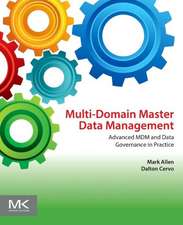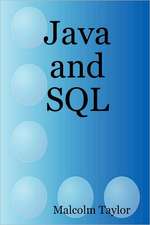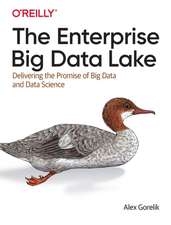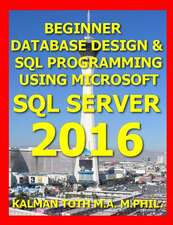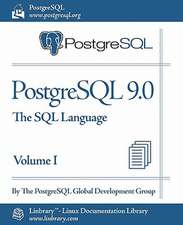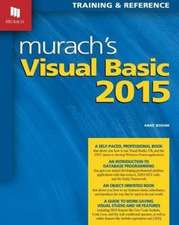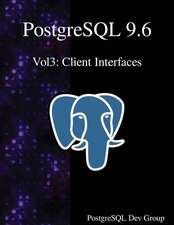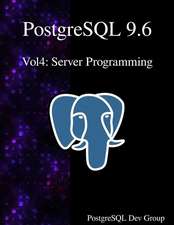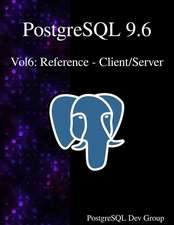Managing Time in Relational Databases: How to Design, Update and Query Temporal Data
Autor Tom Johnston, Randall Weisen Limba Engleză Hardback – 18 aug 2010
The book is organized into three parts. Part 1 traces the history of temporal data management and presents a taxonomy of bi-temporal data management methods. Part 2 provides an introduction to Asserted Versioning, covering the origins of Asserted Versioning; core concepts of Asserted Versioning; the schema common to all asserted version tables, as well as the various diagrams and notations used in the rest of the book; and how the basic scenario works when the target of that activity is an asserted version table. Part 3 deals with designing, maintaining, and querying asserted version databases. It discusses the design of Asserted Versioning databases; temporal transactions; deferred assertions and other pipeline datasets; Allen relationships; and optimizing Asserted Versioning databases.
- Integrates an enterprise-wide viewpoint with a strong conceptual model of temporal data management allowing for realistic implementation of database application development.
- Provides a true practical guide to the different possible methods of time-oriented databases with techniques of using existing funtionality to solve real world problems within an enterprise data architecture environment.
- Written by IT professionals for IT professionals, this book employs a heavily example-driven approach which reinforces learning by showing the results of puting the techniques discussed into practice.
Preț: 337.32 lei
Preț vechi: 458.94 lei
-27% Nou
Puncte Express: 506
Preț estimativ în valută:
64.56€ • 67.15$ • 54.10£
64.56€ • 67.15$ • 54.10£
Carte tipărită la comandă
Livrare economică 06-20 martie
Preluare comenzi: 021 569.72.76
Specificații
ISBN-13: 9780123750419
ISBN-10: 0123750415
Pagini: 512
Ilustrații: 1
Dimensiuni: 191 x 235 x 33 mm
Greutate: 1.04 kg
Editura: ELSEVIER SCIENCE
ISBN-10: 0123750415
Pagini: 512
Ilustrații: 1
Dimensiuni: 191 x 235 x 33 mm
Greutate: 1.04 kg
Editura: ELSEVIER SCIENCE
Public țintă
IT professionals directly concerned with managing data and providing access to it. This includes data modelers, database developers, database designers, data architects, database analysts, corporate database administrators, SQL programmers, and applications systems developers.Cuprins
Part 1. An Introduction to Temporal Data ManagementChapter 1. A Brief History of Temporal Data ManagementChapter 2. A Taxonomy of Bi-Temporal Data Management MethodsPart 2. An Introduction to Asserted VersioningChapter 3. The Origins of Asserted Versioning: Computer Science ResearchChapter 4. The Origins of Asserted Versioning: IT Best PracticesChapter 5. The Core Concepts of Asserted VersioningChapter 6. Diagrams and Other NotationsChapter 7. The Basic ScenarioPart 3. Designing, Maintaining and Querying Asserted Version DatabasesChapter 8. Designing and Generating Asserted Versioning DatabasesChapter 9. An Introduction to Temporal TransactionsChapter 10.Temporal Transactions on Single TablesChapter 11. Temporal Transactions on Multiple TablesChapter 12. Deferred Assertions and Other Pipeline DatasetsChapter 13. Re-Presenting Internalized Pipeline DatasetsChapter 14. Allen Relationship and Other QueriesChapter 15. Optimizing Asserted Versioning DatabasesChapter 16. ConclusionAppendix: Bibliographical Essay
Recenzii
"You cannot escape temporal data. You need to get over it, sit down and read what Tom and Randy are telling you in this book." --Joe Celko, Independent Consultant & Columnist for Intelligent Enterprise, USA"The authors present an original and comprehensive conceptual approach called Asserted Versioning, which includes support for bi-temporality and is a significant advance in the theory and practice of managing time-varying data." --Richard Snodgrass, Professor of Computer Science at the University of Arizona"Information technology consultants Johnston and Weis explain how to integrate time into a business data system, so that the past, present, and projected future of things can be accessed easily and quickly. Tables that show time are versioned tables, and they show how using them lowers the cost and increases the value of temporal data, data that shows change through time. They introduce temporal data management and asserted versioning, then look at designing, maintaining, and querying asserted version databases." --SciTech Book News





